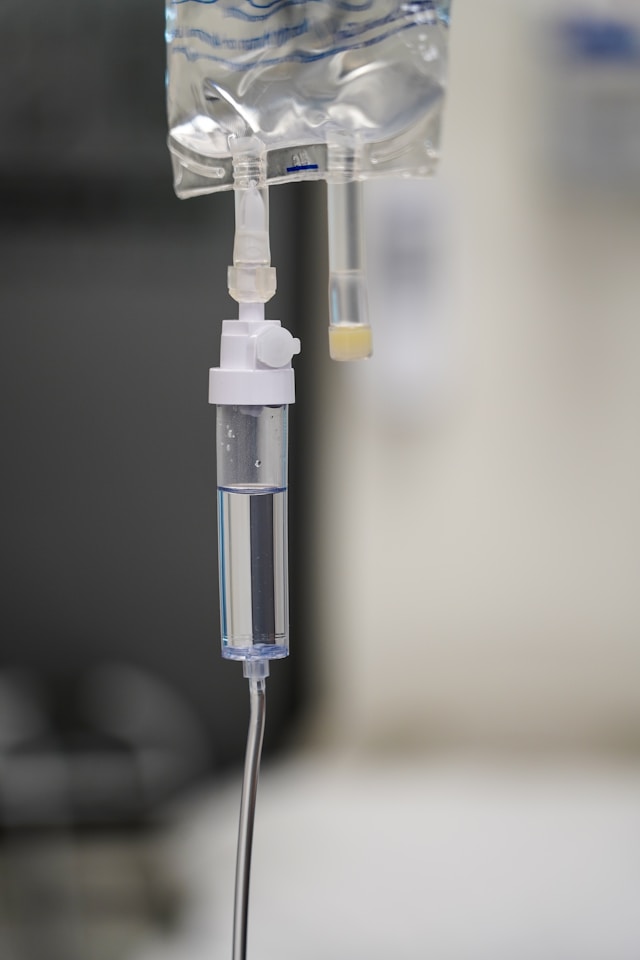
Remicade (Infliximab) Infusions Explained


Dr. Chen is a board-certified immunologist with over 15 years of experience treating autoimmune and immunodeficiency disorders. She specializes in IVIG therapy and has published extensively on immune system treatments.
Medical Disclaimer
Remicade (infliximab) is one of the most widely used biologic medications, transforming treatment for autoimmune and inflammatory conditions including rheumatoid arthritis, Crohn's disease, ulcerative colitis, psoriatic arthritis, ankylosing spondylitis, and plaque psoriasis. As a TNF-alpha inhibitor, Remicade blocks a key protein that drives inflammation, helping millions of patients achieve disease control and improved quality of life. Understanding how Remicade works, what to expect during infusions, and how to maximize treatment success helps you navigate this important therapy.
Key Highlights
- Remicade is a TNF-alpha inhibitor given as IV infusion every 8 weeks after initial loading doses, blocking inflammatory proteins that drive autoimmune disease activity.
- Infusions typically take 2-3 hours initially, potentially shortening to 1-2 hours with established tolerance, making every-other-month treatment manageable for most patients.
- Many patients experience significant symptom improvement within 2-6 weeks of starting Remicade, with continued benefit as long as treatment continues.
What Is Remicade
Remicade (infliximab) is a monoclonal antibody—a laboratory-made protein designed to target and bind to tumor necrosis factor-alpha (TNF-alpha), a substance your body produces that causes inflammation. By blocking TNF-alpha, Remicade reduces the inflammatory cascade driving many autoimmune conditions.
Remicade was one of the first biologic therapies approved for autoimmune diseases, revolutionizing treatment when it became available in the late 1990s. It's been used extensively worldwide with over 20 years of safety and effectiveness data. According to the Mayo Clinic, Remicade remains a cornerstone treatment for inflammatory bowel disease and inflammatory arthritis.
Biosimilar versions of Remicade (Inflectra, Renflexis, Avsola) have become available—these are highly similar to Remicade and work identically but typically cost less. Many insurance plans now prefer biosimilars over the original Remicade product.
Conditions Treated with Remicade
Remicade is FDA-approved for several autoimmune and inflammatory conditions:
Rheumatoid Arthritis: Reduces joint inflammation, prevents joint damage, and improves function when combined with methotrexate.
Crohn's Disease: Induces and maintains remission in moderate to severe Crohn's, heals fistulas, and prevents disease progression.
Ulcerative Colitis: Controls inflammation, heals colon lining, induces remission, and helps avoid colectomy surgery.
Psoriatic Arthritis: Treats both joint inflammation and skin psoriasis symptoms.
Ankylosing Spondylitis: Reduces spinal inflammation, improves mobility, and decreases pain in this inflammatory spine disease.
Plaque Psoriasis: Clears skin lesions in moderate to severe psoriasis.
For all these conditions, Remicade is typically reserved for patients with moderate to severe disease who haven't responded adequately to conventional therapies.
How Remicade Works
TNF-alpha is a cytokine (signaling protein) that your immune system produces to trigger inflammation. In autoimmune diseases, your body produces excessive TNF-alpha, causing the chronic inflammation that damages joints, intestines, skin, or other tissues.
Remicade binds to TNF-alpha molecules, preventing them from attaching to cell receptors and triggering inflammatory responses. This reduces inflammation throughout your body, allowing damaged tissues to heal and preventing further damage.
According to the Crohn's & Colitis Foundation, blocking TNF-alpha can induce remission in many inflammatory bowel disease patients and dramatically improve joint symptoms in arthritis patients.
Remicade Dosing and Schedule
Loading Doses: When starting Remicade, you'll receive infusions at weeks 0, 2, and 6. This loading schedule builds up therapeutic levels quickly.
Maintenance Dosing: After the loading phase, infusions continue every 8 weeks (every other month) indefinitely as long as the medication remains effective and well-tolerated.
Dose: Typically 5 mg per kilogram of body weight, though some patients need higher doses (10 mg/kg) or more frequent infusions (every 6 weeks) if standard dosing doesn't maintain adequate control.
Combination Therapy: Many patients take Remicade along with immunomodulators like methotrexate, azathioprine, or 6-mercaptopurine. This combination can enhance Remicade's effectiveness and reduce the risk of developing antibodies against the medication.
What to Expect During Remicade Infusions
Pre-Infusion Preparation: Before starting Remicade, you'll need tuberculosis screening (TB test or blood test), hepatitis screening, baseline labs, and possibly imaging to assess disease severity. Ensure any needed vaccinations are current before beginning immunosuppressive therapy.
Pre-Medications: Most patients receive acetaminophen and antihistamines 30-60 minutes before Remicade to reduce infusion reaction risk. Some centers routinely give corticosteroids pre-medication as well.
IV Placement: A nurse places an IV catheter in your arm or hand. Good hydration beforehand makes this easier.
The Infusion: Your first Remicade infusion will be given slowly over 2-3+ hours to assess tolerance. Subsequent infusions may be shortened to 2 hours or even 1 hour if you tolerate the medication well without reactions.
During Infusion: You'll be monitored throughout treatment with periodic vital sign checks and nursing assessments. Bring entertainment, work, snacks, and comfort items to make the time comfortable.
Post-Infusion Monitoring: After completing your infusion, you'll remain for observation (typically 30-60 minutes) to ensure no delayed reactions occur before leaving.
Every 8 Weeks: Once on maintenance dosing, you'll return every 8 weeks for treatment. Many patients schedule standing appointments to maintain consistency.
Timeline for Improvement
Quick Response: Many patients notice improvement within 2-4 weeks of starting Remicade. Crohn's and UC patients often experience decreased diarrhea and abdominal pain after the first or second infusion. Arthritis patients may notice reduced joint pain and stiffness within weeks.
Maximum Benefit: Full therapeutic effect typically develops over 3-6 months of regular treatment. Mucosal healing in IBD patients takes several months. Joint protection in arthritis requires sustained treatment.
Sustained Improvement: As long as Remicade remains effective and treatment continues, benefits persist. Most patients who respond to Remicade maintain improvement for years with ongoing infusions.
Benefits of Remicade
Patients responding well to Remicade often experience:
Inflammatory Bowel Disease: Clinical remission with elimination or near-elimination of symptoms, mucosal healing visible on colonoscopy, fistula closure (particularly perianal fistulas), steroid-free remission, avoiding surgery.
Rheumatoid Arthritis: Reduced joint pain and swelling, improved function and mobility, prevention of joint damage and erosions, lower disease activity scores.
Psoriatic Arthritis: Relief from joint symptoms plus improvement in skin psoriasis, reduced enthesitis and dactylitis.
Ankylosing Spondylitis: Decreased spinal pain and stiffness, improved mobility and function.
Psoriasis: Significant skin clearing, reduced plaques and scaling.
Quality of Life: Ability to return to work, participate in activities, reduced hospitalizations, improved overall wellbeing.
The National Institute of Arthritis and Musculoskeletal and Skin Diseases emphasizes that biologic therapies like Remicade have dramatically improved outcomes for patients with inflammatory diseases.
Potential Side Effects and Risks
Increased Infection Risk: TNF inhibitors suppress immune function, making you more susceptible to infections. Upper respiratory infections, urinary tract infections, and other common infections occur more frequently. Serious infections like pneumonia or sepsis affect a small percentage of patients. Report fevers or concerning symptoms promptly.
Infusion Reactions: Acute reactions during or within hours of infusion can include headache, nausea, rash, flushing, itching, fever, chills, chest discomfort, or blood pressure changes. Most reactions are mild to moderate and manageable with slowing infusion rate or providing medications. Severe reactions are uncommon.
Delayed Hypersensitivity: Some patients develop delayed reactions 3-12 days after infusion, including joint pain, muscle aches, fever, rash, or flu-like symptoms. These "serum sickness-like" reactions may indicate antibody development against Remicade.
Tuberculosis Reactivation: Latent TB can reactivate with TNF inhibitor therapy. This is why screening before treatment and preventive antibiotics if latent TB is detected are essential.
Antibody Development: Some patients develop antibodies against Remicade, which can reduce effectiveness or increase infusion reaction risk. Combination therapy with immunomodulators reduces this risk. Blood tests can measure anti-infliximab antibody levels.
Liver Enzyme Elevations: Some patients experience elevated liver enzymes, particularly when combining Remicade with methotrexate or other immunosuppressants. Regular monitoring detects this.
Heart Failure Worsening: Patients with moderate to severe heart failure should not receive Remicade as it may worsen cardiac function.
Demyelinating Disease: Rare cases of neurological conditions affecting myelin have been reported, though causality is uncertain.
Malignancy Risk: Some studies suggest slightly increased risk of certain cancers (particularly lymphoma) with long-term TNF inhibitor use, though absolute risk remains low.
Paradoxical Reactions: Rarely, TNF inhibitors can trigger new-onset psoriasis or other autoimmune conditions.
Your healthcare provider monitors for these issues through regular appointments, symptom assessment, and laboratory testing.
Loss of Response to Remicade
Some patients who initially respond to Remicade experience diminishing benefit over time (secondary loss of response), often due to antibody development:
Signs: Symptoms return or worsen, disease activity increases, shorter duration of benefit between infusions.
Options: Increase Remicade dose (to 10 mg/kg), shorten interval between infusions (every 6 weeks instead of 8), add or optimize immunomodulator to reduce antibody formation, check anti-infliximab antibody and drug levels, switch to a different TNF inhibitor or different mechanism biologic.
Biosimilar Switching: Some patients who develop antibodies to Remicade may respond to switching to a biosimilar or different TNF inhibitor.
Living with Your Condition on Remicade
Infection Prevention: Practice careful hand hygiene, avoid sick contacts when possible, stay current on non-live vaccines, report fevers or infections promptly.
Treatment Adherence: Keep infusion appointments consistently every 8 weeks. Missing or delaying infusions can lead to disease flares and may increase antibody development risk.
Medication Interactions: Inform all your doctors that you're on Remicade. Live vaccines should be avoided. Discuss new medications with your prescribing physician.
Monitoring: Attend scheduled follow-up appointments, complete recommended lab work, and report new symptoms or concerns.
Healthy Lifestyle: Continue disease-specific lifestyle measures—appropriate exercise, nutrition, stress management, avoiding smoking (particularly important for IBD and arthritis patients).
Sun Protection: Some patients on immunosuppressive therapy have increased skin cancer risk. Use sunscreen and protective clothing.
Cost and Insurance Considerations
Remicade is expensive, typically costing $1,500-3,000+ per infusion depending on dose and body weight:
Insurance Coverage: Most plans cover Remicade for FDA-approved conditions with prior authorization demonstrating inadequate response to conventional therapies.
Biosimilar Options: Inflectra, Renflexis, and Avsola typically cost less than brand-name Remicade. Many insurance plans now prefer biosimilars, requiring step therapy or offering lower copays for biosimilar versions.
Copay Assistance: Remicade and biosimilar manufacturers offer copay cards that can reduce out-of-pocket costs to $0-50 per infusion for commercially insured patients.
Patient Assistance: For uninsured or underinsured patients, manufacturers may provide medication at reduced cost or free for those meeting income criteria.
Frequently Asked Questions
How effective is Remicade?
Remicade is highly effective for its approved conditions. For Crohn's disease, about 60% of patients achieve clinical remission and 45% achieve mucosal healing. For rheumatoid arthritis, approximately 60% achieve significant improvement (ACR20 response), with many experiencing even better responses. For ulcerative colitis, psoriatic arthritis, and other conditions, response rates are similar. While not everyone responds, Remicade represents one of the most effective treatments available for moderate to severe inflammatory diseases.
How long does Remicade infusion take?
Initial Remicade infusions typically take 2-3 hours to allow careful monitoring for reactions. Once you've established good tolerance over several infusions, your healthcare team may approve shorter infusion times—some patients receive Remicade in 1-2 hours. The total appointment including check-in, pre-medications, the infusion, and post-infusion monitoring typically lasts 3-4 hours initially, potentially shortening to 2-3 hours with established tolerance.
Can you stop Remicade once symptoms improve?
Stopping Remicade almost always leads to disease relapse within weeks to months. These are chronic conditions requiring ongoing treatment to maintain remission. Some patients who achieve very prolonged remission (several years) may attempt treatment withdrawal under close medical supervision, but relapse risk is high. Most patients continue Remicade indefinitely as long as it remains effective and well-tolerated. Think of it like blood pressure medication—stopping usually means return of the problem.
What's the difference between Remicade and biosimilars?
Biosimilars (Inflectra, Renflexis, Avsola) are highly similar to Remicade with no clinically meaningful differences in safety, purity, or potency. They work identically to Remicade but are manufactured by different companies and typically cost less. Switching from Remicade to a biosimilar or between biosimilars is safe and effective for most patients. Some insurance plans now require using biosimilars instead of brand-name Remicade to control costs.
What happens if Remicade stops working?
If Remicade becomes less effective (secondary loss of response), several options exist: increasing the dose, shortening the interval between infusions, adding or optimizing immunomodulator therapy, checking anti-infliximab antibody levels, switching to a different TNF inhibitor (Humira, Cimzia, Simponi), or trying a biologic with a different mechanism (Stelara, Entyvio for IBD; Orencia, Actemra for arthritis). Most patients who lose response to Remicade can achieve disease control with alternative biologics.
Living Well on Remicade
For many patients with autoimmune and inflammatory conditions, Remicade has been transformative—allowing return to work, participation in activities, and living without constant pain or debilitating symptoms. While requiring ongoing every-8-week infusions represents a commitment, most patients find the treatment schedule manageable and the symptom relief well worth the time investment.
With proper monitoring, infection prevention, and treatment adherence, many Remicade patients achieve long-term disease control and excellent quality of life.
Ready to find an infusion center for your Remicade therapy? Explore infusion providers near you experienced in administering Remicade and supporting patients with inflammatory conditions.
Medical Disclaimer: This content is for educational purposes only and is not a substitute for professional medical advice, diagnosis, or treatment. Always consult your healthcare provider with questions about your medical condition or treatment options.
Article Statistics


Table of Contents
Article Statistics










